How will the blockchain change healthcare?
In this episode, we talk about how the landscape of healthcare globally will change as a result of blockchain technology.
We discuss how the blockchain is already being used in the US and in the NHS and how it could help these large healthcare organisations to become more efficient in how they run and financially.
We hope you enjoyed the show and it helped you to gain more clarity and give you lots of ideas as to how you can use NFTs for your business.
If you have any questions, comments and/or want to become part of our community join us on our Facebook group and/or on Discord.
Or visit us here:
Website: https://www.womenofthemetaverse.co.uk
Instagram: https://www.instagram.com/wotmworld
Twitter: https://twitter.com/WOTMWorld
TikTok: https://www.tiktok.com/@wotmworld
YouTube: https://www.youtube.com/channel/UCvBOeXPJ8z0zGdHul1JwFxQ
IMPORTANT NOTICE
This podcast is for entertainment and education purposes only. We do not give any investment or financial advice and we strongly recommend you always DO YOUR OWN RESEARCH.
Episode Transcription
Welcome to Women of the Metaverse. I am Cheryl Laidlaw.
I am Angela Harkness. We have been and are still on a journey to discover the Metaverse with 3.0 NFTs and anything that we are required to know to join this world
from. From this podcast, we will help you to unlock how the manifest is going to impact your brand.
Your business and even your personal life.
Join us as we take the mystery out of this new digital universe. Welcome to Women of the Metaverse. In this episode, we are talking about how the blockchain has and is gonna change healthcare way back, what seems such a long time ago now we recorded episode seven.
What is blockchain? If you are not listening to it, we urge you once you’ve listened to this one. To download it. We think it’s really interesting and personally I learned a lot from researching that episode. But to help you, do you wanna just give us a quick overview, Cheryl?
Absolutely. So a blockchain is a digital ledger of transactions.
It is a chain of blocks that holds and records the data on transactions as they are completed in chronicle order. So for example, if we create an NFT and put it on Opensea to sell. As soon as we load it onto OpenSea, the first block in the chain is created. When someone buys the nft. The next block is created holding the sales data, how much it was purchased for who sold it and who purchased it.
If it was it sold again, the next block is created and on and on, and so, There is not one blockchain. It is a technology that can be created to hold any data. So if you’re purchasing, for example, an nft, it will tell you what currency you are purchasing it in, and also what blockchain on open sea. It may say that you are purchasing this using E on the Ethereum blockchain, but blockchains certainly are not just for buying and selling.
As the technology grows in all Indu industries, there are companies creating new blockchains. In this episode, we’re not talking about NFTs. We are talking specifically about healthcare, how the blockchain is already being used in this area, and how it may impact our lives in the future. This technology is considered to be much more efficient and secure than the current technology is being used, but the jewelry is still.
It is a fairly new technology, but in this episode we want to talk to you about the possibilities and why it may be used to progress the healthcare
industry. I was really shocked when researching this, how much it is being used already. Yeah. Particularly in the States. So I was really surprised at how many companies have already really working with big, um, healthcare centers and hospitals.
Amazing. So I. If anyone understands the NHS you receive at birth, your lifelong NHS number, but NHS trust for each area are not connected. If you move and you go to your doctors to register, you give them your NHS number, and then they have to request your medical records from, from whatever area you came from.
So I experienced this with my. When my mom was taken into hospital, we would go to one particular hospital that is the standard everybody would go to. But when she had to be taken in, again, I wanted her to go to a different hospital because it was smaller and it was closer to me and my brother. And so when I went to give them the details and say, Oh, well here’s here had a number, they were like, Oh yeah, but we’re not connected.
We can’t see her record. And I was like, Really? Yeah, you could, you know, and it, you know, the, and takes
long to have them sent between obstacles as well.
Yeah. So it, there, there’s still this disparity. So all, although the NHS is this one big thing, actually, it’s really quite disjointed. Yeah. We still need to come a long way.
Yes, we do. In the US it is even more complex because of the nature of their healthcare system connected with insurance companies. So not only is there a requirement for medical records to be stored, but they also hold financial details. For example, your insurance company or even credit card details. So according to reports, there were 692 large healthcare data breaches between 2021 and 2022.
That’s mad. Yeah, that sounds a lot. That’s scary. . When it comes to the blockchain being used in healthcare, what is talked about most is the individual medical records and regardless of what country, there will be some kind of system for keeping medical records. And what unites us all is that we all have a requirement for a medical record, and as we get older, they become longer and more complex.
The blockchain helps these become much more secure and efficient. You as the patient and the medical record holder. We’ll have more control and access, but it’s also easier to access from wherever you are in your healthcare
system. I think this is brilliant actually, because when I went to Greece when I was 16, I went into emergency care, uh, straight into, uh, a special unit because I had a kidney problem.
And to this day, I still don’t know what the issue was. I was in the hospital for 10 days. , Um, I had no idea if it’s on my medical records and I was just told to get on with it. So I had no idea what was wrong with me. No idea.
And you, and you don’t know if it’s there and it could be relevant later in life, couldn’t
it?
Yeah, I have no idea. Just hope it’s gone away.
. Great. So our NHS mine is Cheryl. We don’t own it, obviously , but the one we belong to covers England and Wells. And as we’ve mentioned, you’re given an NHS number at birth, and then your medical records begin. So this is your date of birth. This is your sec. The time of birth.
The problem comes with how disjointed the technology is between different healthcare areas. But the blockchain could solve that problem and therefore enable your medical records to be available and updated from wherever you are, by whoever should be granted access to them. At the moment, you would have to put in a request to get a medical record and then wait to receive them.
So that’s, you know, every time you went to a doctor, it could, Another block could be you’ve had this vaccine or. You’ve had, you’ve given birth or whatever, and it just creates, It’s just a chronic, Yeah, and it’s just a chronic, logical record of what’s gone on in your life. Adding on top of that, depending on where you are in the world and how that is billed or accounted for financially.
So as you know, in the UK we have the nhs. If we went to hospital, there’s no cost to us. We don’t leave having to pay. But our hospital still has to have account for us as a patient being in the hospital, how much it costs, what treatments we receive, all the staff and suppliers that needed to be paid as a result of our care.
If you’re in a different country, in the system, in district, for example, in the US you’ve have, you’ve got that added complexity of who is paying, what does your insurance cover. What the patient pays, what you as a patient might have to fork out. And I’ve seen some of those bills then Mammoth, aren’t they?
Yeah. They nightmare stories in the states. Yeah. I know what happens if the patient doesn’t have insurance and I don’t even know how they start to chase for payment. If you get a bill for a million pounds for being in hospital for a few weeks, the blockchain could be set up to make that any financial accounting and planning much more e.
And you would hope reducing costs or enabling medical centers to just make greater investments in healthcare.
Another area that blockchain is already being useful and will only be increased in the future is supply chain distribution. Just think about how complex it is to run a single hospital to track everything from patients, outbound appointments, clinics, doctors, nurses.
Equipment and drugs. It is its own little world in one building that is highly regulated and very open to mistakes. So the use of blockchain to track the supply chain could drastically increase efficiency, lower costs, provide a better experience for patients and decrease the level of mistakes.
You know, when you ever go to a hospital, I know going to the royal bars, which is quite near.
You walk down these long corridors and there’s always all this equipment left out, like loads of beds, stunts in the hallways, just everywhere, and they need to be tracked. They need to be, someone needs to know where they are, and I’m assuming they have a system for it already, but just that kind of blockchain of this bed was here, moved by so and so on this day, and put ear.
We’d make it so much easier, but just can you imagine the level of equipment in a hospital? I could imagine the
efficiency of your hospital, Angela
So actually strap it upon even. And Warwick NHS Trust used blockchain technology to track covid 19 vaccines because as you know, all vaccines had to be stored differently and there had to be enough distributed to hospitals, GP, surgeries, and vaccine centers.
I know one of the biggest problems, I mean, again, in the nhs, if you are given a prescription, when you leave hospital, there’s always a pharmacy in the hospital and you get that prescription for free because, oh, you know, if you went to a pharmacy outside of hospital, you pay for a prescription, but in a hospital you get it for free.
But I’ve seen people sit for seven hours waiting for a prescription to be delivered from the pharmacy, cuz obviously they’re incredibly busy, but whilst they’re waiting for that prescription to be delivered, that bed is still sat occupied. Though there are people waiting to get beds, but somebody can’t leave the hospital because they’ve not had their prescription.
Yeah. So something like a blockchain that could potentially make that more efficient. Would make it really useful cuz it just like blocks up the process Absolutely. For
that. And my dad used to wait for, to be dropped off for hours and hours. Yeah. Again, using a bed. Or they used to just dumping him, him in his clothes and just leave him on a, on the side and sort of thing.
You know, it’s just not right. Needs to be
sorted. No. Yes it does.
What comes on the back of supply chains is contracts. We have talked a lot about smart contracts that can be written into the blockchain. There is a huge amount of contracts that would be need to be managed again, just in one single hospital contracts to the pharmaceutical companies.
Those that supply medical equipment, agency staff and nurses, cleaners, ambulances, fish equipment, and cater. We have no clue how much is involved. But with the blockchain, smart contracts can be added when contracts are being negotiated. Once the contract has agreed how much payment is made and then renegotiated,
its massive, isn’t it, Mama?
Just huge. Cause what I know, when my mom came home, she had to have certain equipment. It was really efficient actually. So from her li, when they said she was coming out of hospital, by the time she got home, everything, it was the, the house, the bed was at the house, a table there was a wheelchair. They even put a key safe on the outside of the door because carers would be coming in.
But all of that equipment has to be kept track of because we had it in our house for a year. And then some of it needs to be serviced. Some of it needs to be exchanged. Yeah. And just that level of holding all of that data is mammoth, isn’t it? Yeah, it is. Like some people might have that in their house for life that needs to come and come and go.
So the blockchain is something that can just make that more efficient. Yeah. But your dad had stuff too. Oh
yeah, absolutely. Um, we have to ring them
wheelchairs. Yeah. Can you pick your stuff up? Yeah, we did too. Can you, Can you come pick it all up anyway, Research obviously in healthcare is huge. I’ve worked for several pharmaceutical companies and the level of regulation it takes to get a drug out the door is just mammoth.
Some of the simplest tasks would need to be signed off. And the particular area I worked in, everything had to have a fully written process. That you couldn’t use unless you had passed the test to do it, including actually writing processes. So, as you know, to get a drug from development for it to it being given a certificate to be sold can take decades.
What is required to enable that is data and patient data. Again, this is an area where the blockchain can be used because as we have said before, the blockchain can be very open, but also very secure. So using blockchain technology, you can pull just the data that is required. You can input smart contracts that control what a research developer can and can’t have access to.
You can create smart contracts for the supply and use of the data. And to validate the company, cuz I could imagine there’s a lot of forfeit that goes on around data. I dunno if there’s a problem with it being stolen. I’m
sure like in all industries, data
to breach. Yes. As healthcare develops, there may be a greater emphasis for more to be done in home.
For example, if you are fitted with a heart monitor. That data can be automatically put through to a doctor and blockchain technology could track it. You may be prescribed a program which you yourself would need to track and have access to your medical data via the blockchain, and it would mean you can add the required data.
I listen to something the other day where they were talking about what goes on, what goes in a database, and what goes. Onto the blockchain, which is quite interesting. Yeah, so I think there’s still a need for databases, but the whole concept of blockchain make just can just make that movement of data more efficient.
I can say. It just sounds like a more efficient way of the blockchain route. More secure. More secure, and
Yeah. You know, And efficient, right?
They can have access to what they need and block what they don’t know
they need. Yes. Yeah, you’re right.
In this episode, we wanted to introduce you if you haven’t already investigated yourself to blockchain and how it can be a powerful tool and may change the way in which we interact with those elements of our lives that we take for granted every day.
There is always a debate when it comes to data because it can make people very nervous about what information is held about us, how it will be used, and if it is. Blockchain technology is touted to be secure and efficient, but as we said earlier in this episode, the jewelry is still out, but we always advise you to do your own research because if nothing else, it is incredibly interesting and some of the ways in which it is being used is very creative, and it is breaking the boundaries on how reliant we have become with what can be very old and impractical processes.
We hope you enjoyed this episode. Join us next week as we continue our journey into the manifest. See you then.
Bye for.
Thank you for listening to this episode of Women of the Metaverse.
You can find all information, links and people we talked about in the show notes on our website. If you have
enjoyed this podcast, please comment and subscribe.
Join us again in the next episode as we continue this exciting metaverse journey.

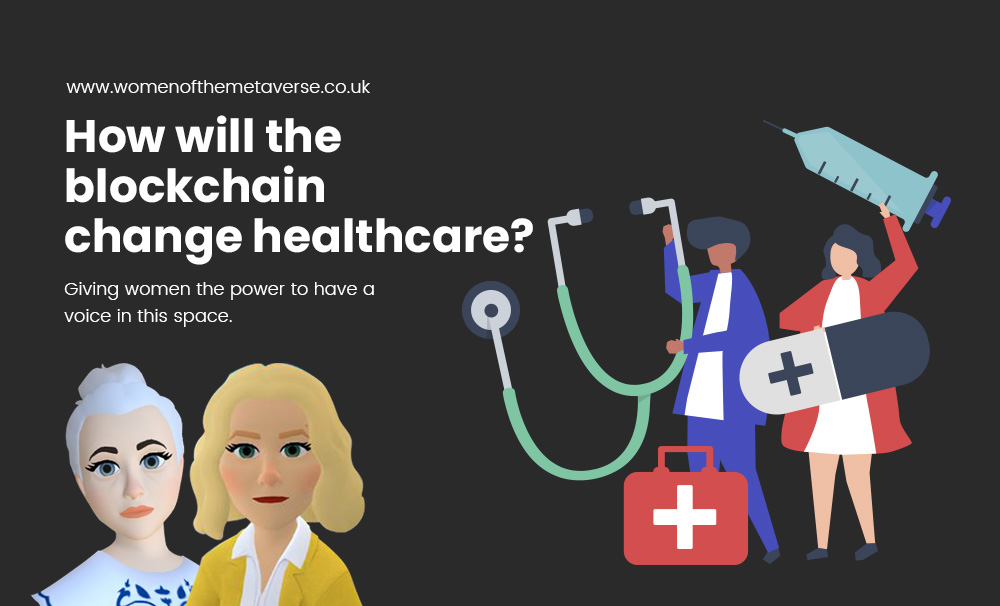
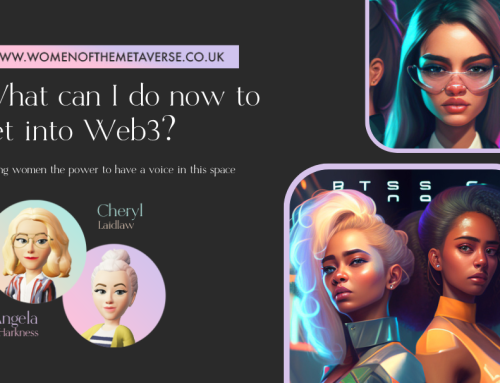
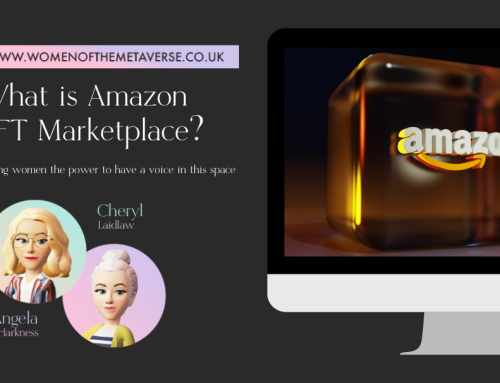
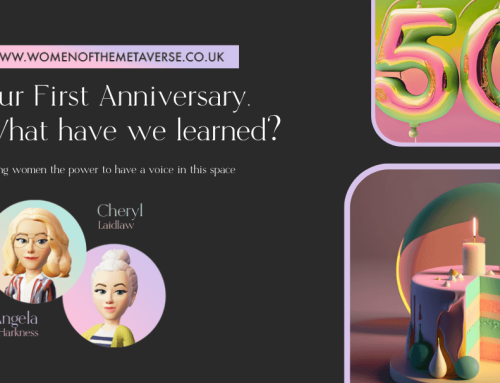
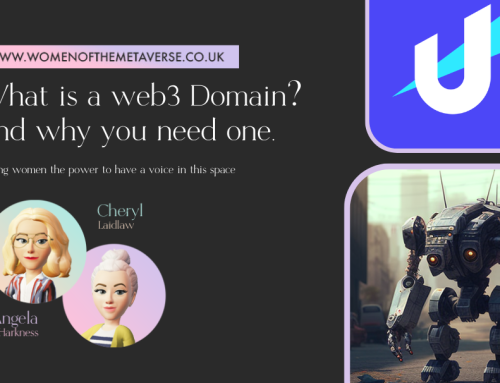
Leave A Comment